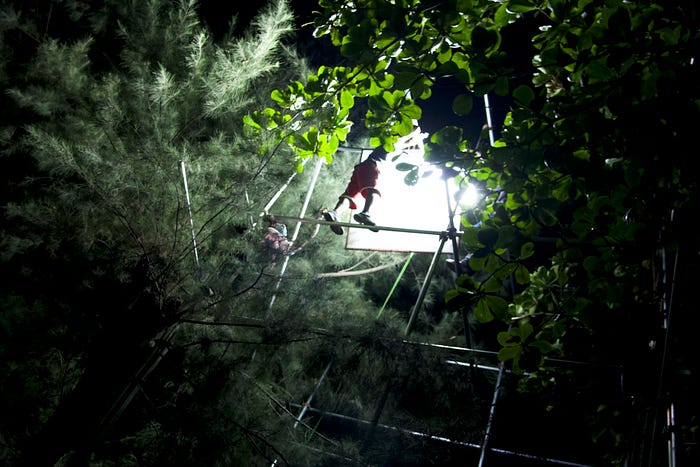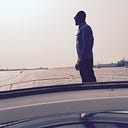Let there be light — the complex logistics of lighting a ‘simple’ night scene for a Nigerian film

In this blog, I’ll be sharing the experience from trying to light an exterior night scene on an island outside Lagos.
People think filmmaking is glamorous. So I thought to begin this by stating categorically that this notion is a lie from the pit of hell. Filmmaking is tears, blood, and if you are unlucky, an incredible logistical beast. Making films in Nigeria is just hard. 100% don’t recommend, as the cool kids say.
But the hard thing about hard things is that if you don’t do hard things, hard things do not get done - if that even makes sense.
The specific hard thing I want to talk about is a difficult logistics thing we had to pull off during the production of my last film, The Black Book — lighting a night scene in Tarkwa Bay.
Why is this thing so hard?
Here’s the thing about film — one person writes it, another person directs, and sometimes, what went on in the mind of the writer doesn’t get to be what the director does. For example, a writer could say “the hero jumped off the skyscraper and landed on the bad guy’s rocket, and hitchhiked to the bad guy’s secure fortress”, which is a perfectly good, exciting scene to write.
A Nigerian director could take that scripted scene and decide that instead of the good guy jumping onto a rocket, he could jump into the bullion van carrying cash to the bad guy's home after a bank heist because it’s more believable in the context of Africa. And maybe not jump from the skyscraper, because you can’t predict what his village people can do — so maybe sneak under the bullion van while it’s parked outside the bank.
But then, even if the director wants to do what the writer wrote, producers could come in and say, “you people should stop this rough play and be realistic — can’t the good guy take an uber?” Yes, dear reader, if you thought producers are the most annoying people in the world, you would be absolutely correct.

Tarkwa Bay or die
So back to the story — the scene is set at a location on Tarkwa Bay, and I want to start here by saying that sometime during the pre-production, the production team came up with the ‘brilliant’ idea to find an alternative location that doesn’t require crossing the Lagos lagoon in boats. It wasn’t an exciting idea and the director a.k.a yours truly, made a halfhearted attempt at finding that alternative. This halfhearted attempt did include visiting every village between Ajah and Epe.

Yes, the stuff we found near Epe was great, but we had to make decisions that best fit the story. While we found nice places, nothing we found worked for the story, so yes, Tarkwa Bay.

We started planning. Tarkwa Bay is home to two military formations — Army and Navy. To shoot a film in Tarkwa we had to get permission from at least one of them. No wahala.
We had approval for the film pending at Army HQ, Abuja, but this needed to happen sooner, so I went to the Army, mining relationships in 81 Division, Victoria Island — this was the division that oversaw Tarkwa Bay. We got a letter allowing us to shoot at the bay, as long as we didn’t show the military the facilities on the ground. Like I said, no wahala.
The next issue was humans — crew and cast accommodation. Not everyone was going to Tarkwa Bay, but that still meant about 100 or so people to accommodate. We scoured every lodging on the bay and soon enough, we were fine.
The real problem
Now, let’s really be honest about why the production team wanted to not shoot at Tarkwa Bay — it was a night scene, and night scenes mean light, light means generating power, which needed at least 50KVA. There was no generator of that size on the bay.
There were various options on the table, including banana boats, long cable reticulation, multiple small generators — none would work. The banana boats would have delivery hiccups; passing power over long distances for film lights isn’t advisable; small generators can’t power the lights.

I believe by now you see where this is going. The obvious problem was how to transport a 50KVA generator to Tarkwa Bay and move it about one kilometre inland — I know that doesn’t sound like a long distance, but there are no roads on the bay, only sand — very soft sand. The only way that could be done was putting the generator on an off-road capable delivery truck, putting that truck on a barge, and taking that barge to the bay. At the bay, we dock and drive off with the generator to the delivery point.
That was the solution in theory. We started looking at various barges and service providers and soon enough found a service that didn’t require a kidney, but even the cheapest options were too expensive for production. I was reminded about how I didn’t hear word about how this was madness. But here we are, so we move.
The great move

On Monday, the crew moved with light, grip, and production design equipment to the bay. Besides the big night shoot, we had other scenes to shoot — a church, a couple of daytime exteriors, and a beach scene. The plan was that we’ll shoot the exteriors, then the church, and on Thursday night, the big night scene.
Looking at that order, we had considered putting the equipment vehicles on the barge and shipping them on Monday, but when it looked like the barge movement would take a bit longer than expected, we moved most of the critical stuff by smaller boats.
Just barge it…lol
Getting trucks to Tarkwa Bay was harder than we first thought. A first delivery attempt on Monday night met with failure.
Recall how the Navy and Army had a small quarrel at the bay? Well, because the Army brought us, the Navy didn’t clear our barge to dock. The barge returned to Lagos. The owner of the barge decided they weren’t going to be involved in the inter-military dogfight and wasn’t interested in the deal any longer. Of course, they did do the run from Lagos to Tarkwa Bay, so he had to be paid.
The second setback was that the owner of the generator/truck we hired had zero faith in our arrangement. They just wouldn’t let the truck get on a barge. That meant we had to pause everything, find another barge and generator/truck whose owner was comfortable with it crossing the lagoon on a barge. This went on for a day and a half, while we successfully negotiated a landing clearance with the Navy. In fact, we became very good friends.
Eventually, we rented both a barge and truck from Julius Berger. Money. But getting the job done was more important. We had to get everything set up for the night shoot on Thursday.
On Wednesday, the JB barge made its way to the bay, carrying with it the camera van, trucks, and a generator. Everyone was excited that it was finally happening. Until it wasn’t. For some inexplicable reason, the trucks that were loaded on the barge happened to be the ones that were not off-road capable. If they got off the barge, they would sink in the sand. We had to take the barge and trucks back to Lagos.

This was the second failed attempt and my hair grayed a few more strands. Production began to discuss the worst-case scenario. In the event that we couldn’t deliver the generator on time, do we leave and come back? Not possible. Do we stay an additional day? Complicated by our schedule, as we had to shoot at Apapa port on Saturday, a highly regulated location that took one year of negotiation to secure.
Wahala
I could not begin to think of what failing to deliver the generator would mean. We would have spent a ton of money, moved equipment and people to the bay, house, and fed them, yet not shot the biggest scene we needed to shoot. Sometimes, difficult scenes like this one are rewritten to work with what is possible, but we could not do that. The interior part of this scene had already been shot earlier in the studio!
On Thursday morning, we decided to give our all to the remaining day scenes and see what happens. In the meanwhile, the lighting team went ahead to build the scaffolding that was required to create the moonlight we needed for the night’s shoot. Nobody knew if we’d get the generator or not. But we were hopeful. The small snag in that hope was that the waters of Lagos lagoon are closed to civilian traffic by 7PM. If the barge didn’t make it before 6PM, we were done for.
About 4PM, our location manager called. The barge had berthed and the truck successfully drove off, on the way to the set. PHEW!!! Thankfully, the light team had acted on their faith and kept rigging. We were going to be on time.
6.55 PM the first lights were on.


I had started discussing the scene with the key actors as soon as the last day scene was done. It was a scene that we already prepared and rehearsed for, so it wasn’t a long conversation. I handed the actors over to the stunt team for final preps.
At about 7PM, I called the associate producer and assistant director. I needed to discuss the scene with the supporting actors, who were actually the most important humans for the scene. That’s when she delivered the biggest bomb of the week.
“Sorry Editi, but the actors are not available. They are still in Lagos”
